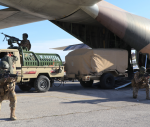You are here
Western Asia commission convenes to discuss urgent regional challenges
By Bahaa Al Deen Al Nawas - Dec 21,2019 - Last updated at Dec 21,2019
AMMAN — Today’s global challenges include reaching the sustainable development goals (SDGs) and addressing issues of violence and armed conflicts, in addition to matters of human rights, Chair of the 30th United Nations Economics and Social Commission for Western Asia (ESCWA) session Abdelhamid Gharbi said on Saturday.
"The world is going through difficult challenges; complicated, dangerous, old and new, which prompt humanity to be afraid for the future," he said.
Gharbi, who is also director of the Sustainable Development Directorate-General for Multilateral Cooperation and Cross-Cutting Issues at the Tunisian Ministry of Foreign Affairs, delivered his remarks during the sixth special session of the ESCWA held in Amman to consider urgent regional issues.
"ESCWA will continue working hard to find solutions to some of the challenges on the agenda," Gharbi said, noting that Somalia and Algeria will be joining ESCWA states.
Planning and International Cooperation Minister Wissam Rabadi highlighted during the session the importance of exchanging expertise in sustainable development areas with the ESCWA, voicing full support for the commission and its efforts to work in the interest of its member states.
The minister highlighted the importance of finding solutions to regional and international issues related to water scarcity, climate change, refugee crises and challenges springing from the fourth industrial revolution and technological developments.
"These challenges are global and require global solutions — no country on its own can resolve problems of climate change or technological interference, and thus, we need solutions that can help this region and the world," Rabadi said. He noted that although it is “not an easy feat”, he believes in the ESCWA's role in bringing a positive change for the future.
Executive Secretary for the ESCWA Rola Dashti said that the commission conveys the issues that Arabs face to the world, and its work lies in raising awareness to help decision-makers create development strategies that help the region achieve the SDGs.
The session covered social protection and the Palestinian cause among various other matters, she said, noting that "the Arab region is the most affected by climate change, as by the end of the century, the average temperatures will increase by 5 degrees here, which is among the highest, and that will affect water resources and the lives of 100 million Arabs".
No Arab country, regardless of its status, is safe from this change, Dashti added, concluding: "Regardless of all challenges, I am certain the Arab world has a promising future...."
In a separate meeting, Rabadi and Dashti discussed cooperation between Jordan and the ESCWA and mutual efforts to achieve the SDGs, according to the Planning Ministry.
The session was attended by senior officials and representatives from the various ESCWA member states, who are continuing their discussion on Sunday to address various matters and brainstorm solutions to problems facing the Arab world.
Related Articles
AMMAN — Foreign Minister Ayman Safadi on Tuesday received UN Economic and Social Commission for Western Asia (ESCWA) Executive Secretary Rol
AMMAN — The Planning Ministry and the Finance Ministry on Thursday launched the Social Expenditure Monitor for Jordan, developed by the UN E
AMMAN — The 2023 Creative Industries Forum, titled "Promoting Arab Creativity," kicked off in Amman on Tuesday.















